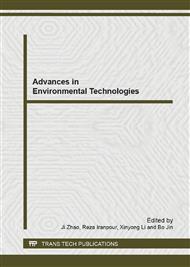p.1121
p.1130
p.1134
p.1138
p.1142
p.1147
p.1151
p.1155
p.1162
Incinerator Stop Operation Assessment and Municipal Solid Waste Disposition Adjustment
Abstract:
Incineration is the main way to dispose the municipal solid waste (MSW) in Taiwan. The amount of MSW is rapidly decreased during recent 10 years due to the policies implementation of waste reduction and resource recycle since 2003. Assessment of incinerator operation stop and transformation therefore becomes an essential issue. An evaluation framework was constructed and put into practice in this research. With the considerations of service status, operation performance, MSW treatment status and the impact level of stopping operation was integrated and assessed in the first stage. An optimal model was built for re-programming the MSW clean strategies of original service areas by taking account of MSW collection distance, design capacity of incinerators and the heating value of solid waste in the second stage. A case study was implemented for four incinerators in Kaohsiung City of southern Taiwan to demonstrate the feasibility of proposed assessment framework.
Info:
Periodical:
Pages:
1142-1146
Citation:
Online since:
August 2013
Authors:
Keywords:
Price:
Сopyright:
© 2013 Trans Tech Publications Ltd. All Rights Reserved
Share:
Citation:


